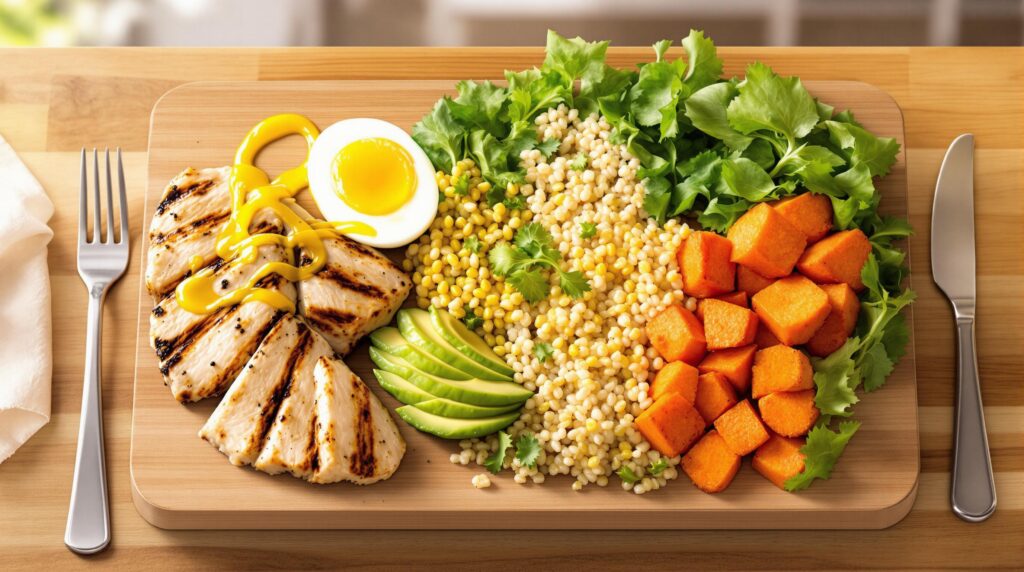Have you ever wondered why so many people struggle with weight loss? It’s because of nutrition myths that confuse us. These myths can make it hard to reach a healthier lifestyle.
Every year, many people try different diets. But, about 85% of them gain back the weight within a year. This makes us wonder if we really know what we’re doing. By spotting and avoiding dieting traps, we can find better ways to eat.
If you’re ready to debunk diet myths and find lasting solutions, you’re in the right spot. We’ll show you what really helps with weight loss and why some methods don’t work. For more on diet myths, check out this informative article.
Understanding Weight Loss and Diet Plans
Exploring effective weight loss diets starts with understanding the science behind it. Weight loss happens when you burn more calories than you eat. This balance, or caloric deficit, affects your metabolism. Your basal metabolic rate (BMR) shows how many calories your body needs at rest, helping you lose weight faster.
The Science Behind Weight Loss
Metabolism is complex, involving how your body uses food energy. Age, gender, muscle mass, and hormones all play a part in weight loss. Focusing on a sustainable caloric deficit is key, not extreme diets. Knowing this helps you create a healthy diet that fits your goals.
Role of Nutrition in Weight Management
Nutrition is more than just counting calories. Eating a variety of whole foods is essential for health and weight loss. Balanced nutrients—proteins, carbs, and fats—are important for a diet that keeps you full and energized. Research shows that focusing on nutrition leads to better weight management. Choosing whole foods over processed ones can help you achieve lasting results. For more on diet plans, check out effective weight loss strategies.
| Diet Plan | Key Features | Who It’s For |
|---|---|---|
| Mediterranean Diet | Focuses on whole foods, olive oil, and lean proteins | Ideal for families and heart-healthy lifestyles |
| Intermittent Fasting | Limits eating to specific time windows | Great for those with unpredictable schedules |
| High-Protein, Low-Carb Diet | Reduces carbs while increasing protein intake | Suitable for those looking to gain muscle and lose fat |
| Plant-Based Flexitarian Diet | Combination of mostly plant-based meals with occasional meat | Perfect for those transitioning to a plant-based diet |
Understanding weight loss and nutrition empowers you to make informed choices. These principles help you navigate your weight management journey effectively.
Popular Diet Plans Explored
Dieting can feel overwhelming with so many options. Knowing about different diet plans helps make better choices. This section looks at some top diet plans for losing weight, their special features, and benefits.
Mediterranean Diet
The Mediterranean diet focuses on whole foods, healthy fats, and lots of fruits and veggies. It promotes balanced meals and supports heart health. Studies show it helps manage weight and encourages healthy eating habits.
Ketogenic Diet
The ketogenic diet is low in carbs and high in fats, leading to ketosis. This diet can lead to quick weight loss. But, it can be hard to stick to and might lack some nutrients.
Paleo Diet
The Paleo diet is all about eating whole foods and lean proteins, avoiding processed foods. It’s known for being effective in weight loss. Yet, following it strictly can be tough and might lead to nutrient gaps.
Intermittent Fasting
Intermittent fasting is a flexible eating method. It involves eating only during certain times, which can improve metabolic health and weight loss. It’s important to think about your lifestyle before trying it.
| Diet Plan | Key Features | Potential Benefits | Challenges |
|---|---|---|---|
| Mediterranean Diet | Whole foods, healthy fats, high fruits and vegetables | Weight loss, heart health | Requires meal planning |
| Ketogenic Diet | Low-carb, high-fat, promotes ketosis | Rapid weight loss | Sustainability, nutrient deficiencies |
| Paleo Diet | Whole foods, lean proteins, eliminates processed foods | Nutrient-dense, effective weight loss | Strict adherence, possible nutrient gaps |
| Intermittent Fasting | Eating windows, flexible approach | Improved metabolic health | Requires lifestyle adjustment |
The Role of Caloric Intake
Understanding how many calories you eat is key to managing your weight. When you eat fewer calories than you burn, you lose weight. It’s important to track your calories to make sure you’re in a deficit. But remember, not all calories are created equal. Where your calories come from affects your hunger and metabolism.
Defining Caloric Deficit
To start losing weight, first, track how many calories you eat each day. Keeping a food diary or using an app can help. Follow expert diet tips to make better food choices. Focus on foods that are full of nutrients and keep you feeling full.
Importance of Portion Control
Controlling how much you eat is vital for losing weight. Even healthy foods can make you gain weight if you eat too much. Here are some tips to help you control your portions:
- Use smaller plates to make your meals look bigger.
- Pre-portion snacks into smaller containers to avoid overeating.
- Eat slowly and pay attention to when you’re full.
- Plan your meals and snacks to avoid eating too much.
By following these tips, you can manage your portions better and help your weight loss journey.
Macronutrients: What You Need to Know
Knowing about macronutrients is key for a balanced diet. They are carbohydrates, proteins, and fats. Each one is important for your health. Understanding them helps you make better food choices for weight loss.
Carbohydrates vs. Proteins vs. Fats
Each macronutrient has its own benefits and calories. Here’s a quick guide to help you understand their roles:
| Macronutrient | Calories per Gram | Key Functions | Food Sources |
|---|---|---|---|
| Carbohydrates | 4 | Primary energy source; aids in carbohydrate metabolism | Whole grains, fruits, vegetables |
| Proteins | 4 | Builds and repairs tissues; supports immune function | Lean meats, eggs, legumes |
| Fats | 9 | Supports cell growth; aids in nutrient absorption | Nuts, avocados, olive oil |
Balancing Macronutrients for Weight Loss
For weight loss, a balanced diet is essential. Focus on complex carbs over simple sugars. They keep your energy stable and reduce hunger.
Studies show that changing your protein and fat intake can boost your metabolism. Eating more protein can make you feel full longer. Adjusting your macronutrient ratios to fit your lifestyle can help you lose weight successfully.

Common Diet Myths Debunked
Knowing the truth about diet myths can guide you on your weight loss journey. Many false beliefs surround food and weight management. By clearing up these myths, you can find better ways to lose weight.
Myth: Carbs are the Enemy
Some think carbs and weight loss don’t mix. But, not all carbs are bad. Foods like whole grains, fruits, and veggies are full of nutrients and fiber. They’re good for your health.
Choosing better carbs can help you stay on track. You don’t have to cut carbs out completely.
Myth: All Fats are Bad
Many believe fats should be avoided because of their calories. But, healthy fats are important for a balanced diet. Foods like avocados, nuts, and olive oil are full of nutrients.
They can also help with weight loss when eaten in the right amounts.
Myth: Skipping Meals Aids Weight Loss
Some think skipping meals helps with weight loss. But, this can lead to hunger and overeating later. Eating regularly keeps your energy stable and prevents big hunger.
The Psychological Aspect of Dieting
Understanding the psychological side of weight loss is key to reaching your goals. Mindful eating is a great way to improve your journey. It helps you pay attention to your body’s hunger and fullness signals. This leads to a better relationship with food.
Mindful Eating Practices
Mindful eating means eating slowly and enjoying each bite. It helps you tell the difference between hunger and emotional eating. Key parts of mindful eating include:
- Eliminating distractions during meals
- Focusing on the sensory aspects of food, such as taste and texture
- Listening to your body, honoring your hunger and fullness cues
Adding these habits to your daily life can greatly improve your diet. It helps with weight loss and balances your eating habits.
Recognizing Emotional Eating Triggers
Knowing what makes you eat emotionally is vital for weight loss success. Common triggers are stress, boredom, or sadness. Understanding these can help you find better ways to cope. Here are some tips:
- Keep a food journal to track your feelings and eating patterns
- Practice stress-reduction techniques like meditation or yoga
- Seek support from friends, family, or professional counseling when needed
By recognizing and dealing with these triggers, you can start using healthier diet strategies. Focusing on the mental side of weight loss can change how you view food for good.

Sustainable Weight Loss Strategies
Starting your weight loss journey means adopting strategies that last. It’s key to set realistic goals for weight loss. This ensures your efforts are successful and you can keep it up.
Having goals you can reach keeps you motivated. It helps you stay on track with your health goals.
Setting Realistic Goals
Setting specific, measurable, and achievable goals is a smart move. Experts say aiming for 1 to 2 pounds of weight loss per week is best. This way, you can enjoy small wins along the way.
Tracking your progress helps you see how far you’ve come. It also lets you adjust your goals as needed.
Meal Prep for Success
Good meal prep makes healthy eating easier. Preparing meals ahead of time means fewer daily decisions. This leads to better choices.
Include fresh veggies, lean proteins, and whole grains in your prep. This makes your meals nutritious and satisfying.
Customizing your meals to your liking helps you stick to your diet. Use containers for portion control. This prevents overeating.
Understanding your body is important. Calculating your Body Mass Index (BMI) helps set realistic goals. It also helps spot health risks related to weight. For more on BMI, check out this link: BMI Calculator.
Nutrient Timing: Does it Matter?
Nutrition is key in your fitness journey, focusing on meal timing around workouts. Knowing when to eat can boost your performance and recovery. Both pre-workout and post-workout meals are vital for effective weight loss. Let’s explore how eating right before and after exercise helps you reach your weight loss goals.
Pre-Workout Nutrition
Your body needs the right fuel before hitting the gym. Focus on carbs for energy and protein to keep muscles intact during workouts.
Here are some great options for pre-workout nutrition:
- Banana with almond butter
- Greek yogurt with berries
- Oatmeal topped with nuts
- Whole-grain toast with avocado
These foods give you quick energy, helping with performance and weight loss.
Post-Workout Recovery Meals
After working out, your body needs the right food to recover and regain energy. Post-workout meals should mix protein and carbs. Protein fixes muscles, and carbs refill glycogen stores. This mix is key for muscle growth and recovery.
Consider these options for effective post-workout nutrition:
- Grilled chicken with quinoa and steamed vegetables
- Protein smoothie with spinach, banana, and protein powder
- Salmon with brown rice and broccoli
- Cottage cheese with pineapple
Adding these meals to your routine can greatly support your weight loss and fitness goals.

The Impact of Hydration on Weight Loss
Hydration is key for losing weight. A hydrated body works better, boosting metabolism and health. Knowing how hydration helps with weight loss can guide you to reach your goals.
How Water Affects Metabolism
Water is essential for breaking down food and using energy. Research shows it can speed up your metabolism, helping you burn more calories. When you’re hydrated, you might feel less tired during exercise, leading to better workouts and weight loss.
Safe Weight Loss with Hydration
Safe weight loss means drinking enough water to keep your body running right. It can help you feel full and avoid eating too much. Try drinking water before meals, carrying a water bottle, and eating hydrating foods like fruits and veggies.
Focus on hydration to succeed in your weight loss journey. It not only boosts metabolism but also improves your overall health. Make drinking water a habit to manage your weight and stay healthy.
Adapting Diet Plans to Individual Needs
Successful weight loss diets focus on making meal plans fit your life and tastes. Personalized diet plans help you stick to your goals and enjoy the journey. Customization is key to managing your health well.
Personalization Based on Lifestyle
Your lifestyle affects how well a diet works for you. Think about your daily routine, work hours, and how active you are. A diet that matches your life is easier to follow.
- Look at your daily activities and how much energy you need.
- Choose meals that fit your schedule, like quick snacks or big meals on days off.
- Focus on physical activities you like, making it easier to stay on track.
Considering Food Preferences
What you like to eat is important for dieting. Enjoying your meals makes losing weight more fun and lasting. Knowing what you like and dislike is essential for staying motivated.
- Find out your favorite foods and look for healthier versions.
- Try new recipes that taste good and are good for you.
- Get friends or family involved in cooking to make it fun and support your goals.

Success Stories: Real People, Real Results
Weight loss success stories are very motivating. They show how people have changed their bodies and lives. These stories prove that certain diets really work.
Transformative Experiences
Many success stories show amazing weight loss. For example, the Mayo Clinic Diet helps people lose 5.3% of their body weight. Some lose up to 13% in six months.
Emily lost 57 pounds, and Rich lost 56 pounds. Victoria lost 58 pounds. These stories show different ways to achieve success.
Lessons Learned from Success
Success stories often talk about commitment and setting realistic goals. They also highlight the importance of a supportive community. Preparation and determination are key to staying on track with diets.
The Mayo Clinic Diet shows how to start with success. It has phases like “Lose It” for quick weight loss. This builds confidence and keeps people going.
Learning from others can help you on your weight loss journey. Stories of people who lost 30 pounds or more are inspiring. They show that with the right mindset and resources, you can reach your goals. For more weight loss success stories, check out the experiences that offer practical tips for lasting change.
Maintaining Long-Term Weight Loss
Keeping weight off for good is more than a quick diet. It’s about making healthy habits that last. Simple changes like cooking healthy meals, staying active, and sleeping well are key. They help you stay well and keep the weight off.
Checking in on your weight loss journey is vital. It helps you see how far you’ve come and what you need to work on. Weighing yourself, writing down what you eat, or talking to a friend can keep you motivated.
Having people to support you makes a big difference. Talking about your journey with someone who gets it can be really helpful. Remember, you don’t have to do this alone. By focusing on healthy habits and regular check-ins, you can achieve lasting weight loss.




Pingback: Finished keto? Here’s how to keep the weight off for good
Pingback: Metabolic Syndrome Diet: Hit the 5 Markers